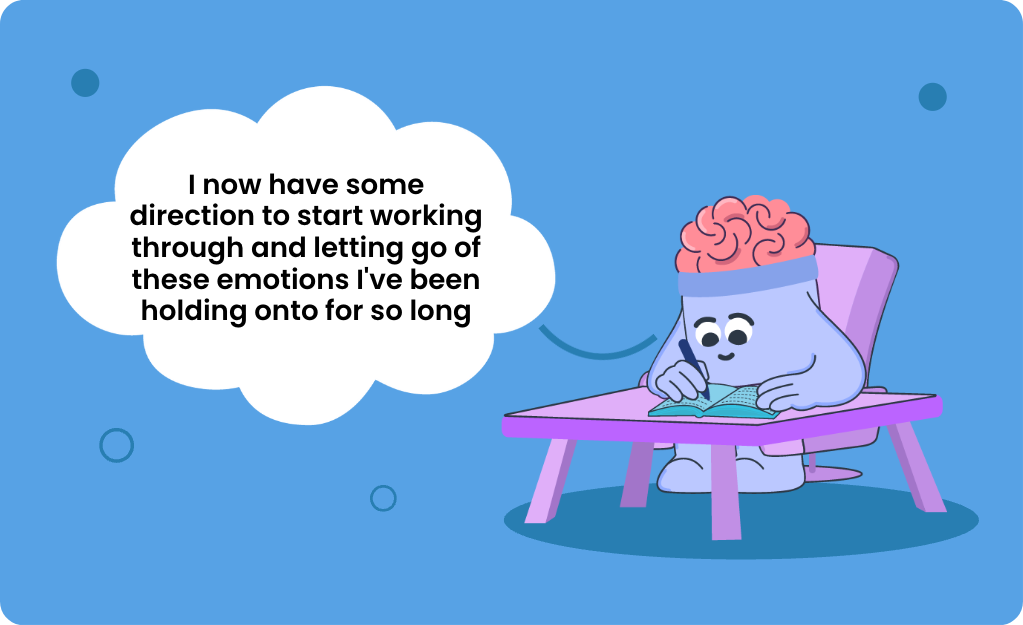When it comes to processing trauma, journaling can be really effective,
because it can help you to:
- Re-expose yourself to your trauma in a controlled way and at a pace which suits you;
- Understand your trauma better and gradually come more to terms with what happened;
- Navigate the complex emotions you have surrounding it.
So, to help you achieve these objectives, we've put together a collection of journal prompts for you below that we encourage you to thoughtfully write out your response to.
Journal Prompts To Help You Process Trauma
1. What do you recall about this traumatic event? Write down your memories in as much detail as possible (however, please do so at a pace you're comfortable with so that you don't become overwhelmed).
2. In what ways has this event impacted you?
For example:
- How have you changed as a person?
- How has your worldview changed?
- How have your relationships with others changed?
- How has it impacted your behaviours and the decisions you make?
- How has it impacted your self-worth and the way you perceive yourself?
- Is there any way in which it's impacted you positively?
3. When you reflect back on the traumatic event, what thoughts and feelings arise?
4. Do you judge any of the thoughts and/or emotions you have surrounding this event? If so, in what ways? And, if it was your best friend who'd been through this traumatic experience and was having these same thoughts and emotions, then would you judge them in the same way that you're judging yourself? If not, then what does this tell you?
5. Who / what do you blame for this traumatic event? Why?
- Note: This may not be one person, but multiple people – and it could also be one or more environmental factors. If this is the case, then assign a "percentage of blame" to each of these contributors that you believe are responsible for the traumatic event taking place.
6. Would you be willing to forgive the people you blame for the traumatic event taking place? If not, then how do you think refusing to forgive them has impacted you thus far – and how do you think it will continue to impact you moving forwards? On the other hand, if you did choose to forgive them, then in what ways could this impact you moving forwards?
7. Do you blame yourself at all for the traumatic event taking place? If so, how? And, if it was your best friend who'd been through this traumatic experience instead of you, then would you blame them? If not, then what does this tell you?
8. What emotions from this traumatic event have you been holding on to for a long time which you'd like to release yourself from?
9. When it comes to this traumatic event, what would the “inner child” in you (or the vulnerable part of you) like to hear more than anything else?
10. If it was your best friend who'd been through this traumatic experience, then what would you say in order to help them:
- Feel a sense of closure?
- Feel a sense of peace?
- Feel empowered?
11. In what ways have you tried to deal with this trauma in the past? How has this worked or not worked?
12. Are there any barriers and/or fears that have held you back from trying to confront and heal from this trauma in the past? If so, what are they?
13. When it comes to this traumatic event, what does healing look like for you?
14. Moving forwards, what do you think needs to happen in order for you to be able to heal from this event?
15. What could you do / what are some habits you could start developing in order to kickstart – or accelerate – this healing journey?
16. Do you feel ready to start healing from this trauma? Why or why not?
We really hope you find these journal prompts effective at helping you process trauma.
All our love,
The Depression Project Team.
P.S. If you're battling trauma, then you'll find our interview with trauma expert Sarah Baldwin really, really helpful, in which we'll cover:
- How trauma is NOT an event - but rather, how an event overwhelms our body's capacity to process what is happening.
- What some of the common - but not-so-obvious - experiences that can lead to trauma are.
- Why the same event(s) can result in trauma for one person but not another.
- How trauma gets "stuck and stored" in your body - and why having trauma does NOT mean that you are "broken" or that there is "something wrong with you".
- How it really is possible to let go of trauma and heal from it.
- Why you may not be able to remember some or all of a traumatic event; why you don't actually need to in order to heal from trauma; and why your memories may start to come back as you begin to heal from trauma.
- How at its core, healing from trauma involves showing your body that what happened is over, and that now, you are safe.
- How to regulate your nervous system in order to feel safe.

Access to this interview and lots of other resources are included as part of our Depression Bootcamps Membership Platform - which you can learn more about by clicking the button below.

